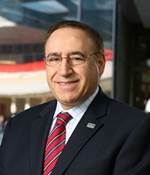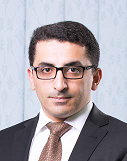- Home
- Objective
- Keynote Speakers
Mohamad Sawan Canada Research Chair in Smart Medical Devices Polystim Neurotechnologies Laboratory Polytechnique Montreal, Canada
Prof. Mohamad Sawan
Fabrice Wendling (PhD) holds a position of Director of Research at INSERM

Prof. fabrice Wendling
Metin Akay is currently the founding chair of the new Biomedical Engineering Department and the John S. Dunn professor of biomedical engineering at the University of Houston

Prof. Miten AKAY
Bart Bijnens

Prof. Bart Bijnens
ICREA Research Professor in the Department of Information and Communication Technologies at Universitat Pompeu Fabra (UPF)
Patrick Flandrin

Prof. Patrick Flandrin
CNRS "Research Director" at École normale supérieure de Lyon
Ghaleb Husseini Professor- AUS Chemical Eng. Department, Sharjah, UAE
 Prof. Ghaleb Husseini
Prof. Ghaleb Husseini
Peter Stadler Algorithms, Computing in Mathematics, Natural Science, Engineering and Medicine, Bioinformatics University of Leipzig ,
 Prof. Peter Stadler
Prof. Peter Stadler- Invited Speakers
- Partner Universities
- Lebanese University, LU, LB
- Saint Joseph University, USJ, LB
- Notre Dame University, NDU, LB
- Rafic Hariri University, RHU, LB
- Islamic Univ. of Lebanon,IUL, LB
- Saint Esprit of Kaslic Univ. USEK, LB
- More...
- Modality and submission
Paper presentation and submission

The conference will consist of oral presentations of fifteen minutes with few plenary sessions. All submitted papers will be peer reviewed. Accepted papers will be published as a collective work in an electronic format and will be submitted for inclusion to IEEE Xplore
 Mohammad Qasaimeh
Mohammad Qasaimehtitle:Microfluidics for Biological and Medical Applications.
Abstract:
Over the last two decades, microfluidics has emerged as a technology with significant impact on medical research and clinical applications. The ability to manipulate fluids at the microscale has led to new methods to manipulate and study biological entities. During this presentation, I will talk about three different systems that we developed to tackle different biomedical applications. The first system intended to study cancer cell survival and death following stimulation with Tumor Necrosis Factor (TNF). Using the system, cells were selectively exposed to brief pulses of TNF, as short as 8 s. We studied the survival and death pathways in cells, and preliminary results suggested that short pulses of TNF stimulation can provoke early cancer cell death. The second system I will be talking about is the Microfluidic Quadrupole (MQ), which constitutes the first experimental demonstration and characterization of fluidic quadrupoles. We used the MQ to manipulate concentration gradients of Interleukin-8 atop human neutrophils cultured in a Petri dish. We challenged neutrophils with stationary and moving gradients and studied their dynamics during adhesion, polarization, and migration. Lastly, I will discuss our recent experiments in using the microfluidic technology to capture circulating tumor cells from blood samples taken from cancer patients. Isolated cells were stained and numerated to correlate with the cancer progression.
Biography:
Dr. Mohammad Qasaimeh is an Assistant Professor of Mechanical and Biomedical Engineering at New York University Abu Dhabi (NYUAD). He established the Advanced Microfluidics and Microdevices Laboratory (AMMLab) at NYUAD, where his group is focused in developing microfluidic and MEMS devices for biomedical applications and point of care diagnostics. Prior to joining NYUAD, he was a Postdoctoral Research Associate at Massachusetts Institute of Technology and Harvard Medical School, and earned his PhD degree in Biomedical Engineering from McGill University. Dr. Qasaimeh received several prestigious fellowships and awards during his career including the NSERC Postdoctoral Fellowship, the Alexander Graham Bell Graduate Scholarship (CGSD3), and the FQRNT Students-Researchers Stars Award. Dr. Qasaimeh research has been published in several peer-reviewed journals including Nature Communications, Lab on a Chip, PLOS Biology, Scientific Reports, and Biomedical Microdevies.
- Keynote Speakers









 Mohamad Sawan
Mohamad Sawan